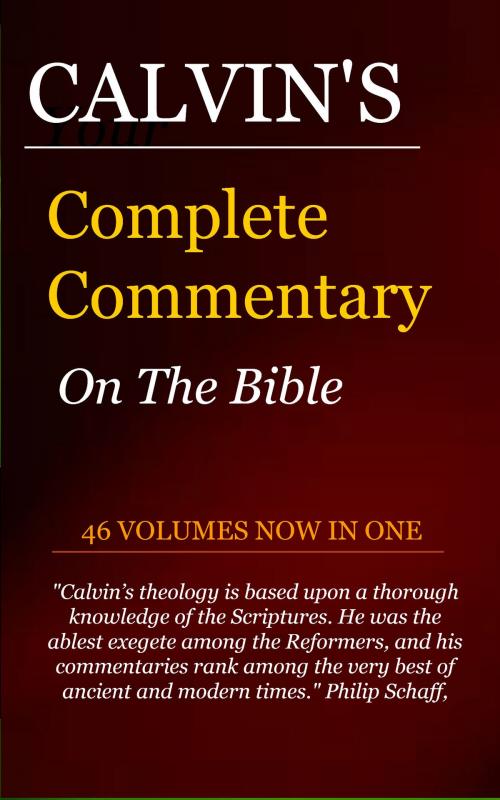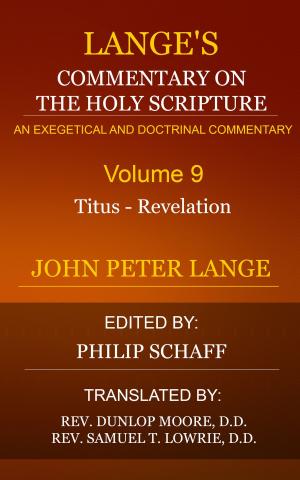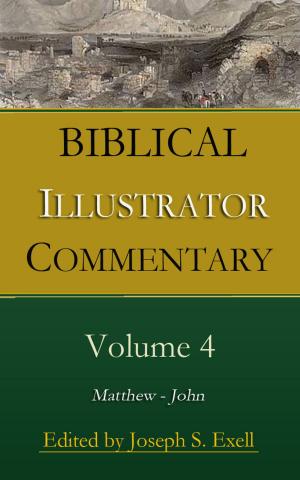Calvin's Complete Commentary on the Bible (46 Volumes in 1)
Nonfiction, Religion & Spirituality, Bible & Bible Studies, New Testament, Commentaries| Author: | Calvin, John | ISBN: | 1230000634052 |
| Publisher: | Delmarva Publications, Inc. | Publication: | August 27, 2015 |
| Imprint: | Language: | English |
| Author: | Calvin, John |
| ISBN: | 1230000634052 |
| Publisher: | Delmarva Publications, Inc. |
| Publication: | August 27, 2015 |
| Imprint: | |
| Language: | English |
All 46 of the original volumes are included in this one volume. There are two linked indexes in this volume, a main index at the front of this volume that will take you to the beginning each of the books of the bible and another index at the beginning of each book there is a linked scripture index leading to the particular subject.
John Calvin is considered as the first truly great scholar of the Reformation. Indeed, he has even been seen by some to be one of history’s greatest Christian biblical scholars. He had an incredible command of the Bible, and his interpretations were not based on just one or two passages. He combined pastoral insight with solid exegesis to form a strong interpretation of the scriptures. However, some of his views on the prophetic interpretation, such as in the book of Daniel, are controversial. He put forth a purist view and believed that the prophecies in the book of Daniel applied solely to the history between the time of the prophet Daniel (530 BC) and Jesus’ first coming (30 AD).
Nevertheless, John Calvin was a force to be reckoned with, and is considered to have a unique insight which enabled him to find the true meaning of the Bible. Dutch theologian Jacobus Arminius, after whom the anti-Calvinistic movement Arminianism was named, states that, “Next to the study of the Scriptures which I earnestly inculcate, I exhort my pupils to peruse Calvin’s Commentaries, which I extol in loftier terms than Helmich himself (a Dutch divine, 1551–1608); for I affirm that he excels beyond comparison in the interpretation of Scripture, and that his commentaries ought to be more highly valued than all that is handed down to us by the library of the fathers; so that I acknowledge him to have possessed above most others, or rather above all other men, what may be called an eminent spirit of prophecy. His Institutes ought to be studied after the (Heidelberg) Catechism, as containing a fuller explanation, but with discrimination, like the writings of all men.”
During his life, Calvin produced commentaries on 48 books of the Bible, a total of 45 published volumes. He intended to put out a complete commentary of the Bible, but his death prevented this. The books of Judges, Ruth, 1 & 2 Samuel, 1 & 2 Kings, 1 & 2 Chronicles, Ezra, Nehemiah, Esther, Job, Proverbs, Ecclesiastes, Song of Solomon, 2 & 3 John, and Revelation were unfortunately not completed. He did, however, write a two volume commentary of the Harmony of the Gospels (Matthew, Mark, and Luke) as well as a separate commentary for the gospel of John. Likewise, he also wrote a two volume series on the Harmony of the Law (Exodus, Leviticus, Numbers, and Deuteronomy).
Calvin’s own exegesis of the original text allowed him to bring out a unique and pleasing interpretation. He begins each section of scripture with his own translation of the text and then further expounds upon it, point by point, making it an excellent resource for ministers and teachers alike. After more than 400 years, Calvin’s commentaries are still a relevant and essential tool for Christians.
All 46 of the original volumes are included in this one volume. There are two linked indexes in this volume, a main index at the front of this volume that will take you to the beginning each of the books of the bible and another index at the beginning of each book there is a linked scripture index leading to the particular subject.
John Calvin is considered as the first truly great scholar of the Reformation. Indeed, he has even been seen by some to be one of history’s greatest Christian biblical scholars. He had an incredible command of the Bible, and his interpretations were not based on just one or two passages. He combined pastoral insight with solid exegesis to form a strong interpretation of the scriptures. However, some of his views on the prophetic interpretation, such as in the book of Daniel, are controversial. He put forth a purist view and believed that the prophecies in the book of Daniel applied solely to the history between the time of the prophet Daniel (530 BC) and Jesus’ first coming (30 AD).
Nevertheless, John Calvin was a force to be reckoned with, and is considered to have a unique insight which enabled him to find the true meaning of the Bible. Dutch theologian Jacobus Arminius, after whom the anti-Calvinistic movement Arminianism was named, states that, “Next to the study of the Scriptures which I earnestly inculcate, I exhort my pupils to peruse Calvin’s Commentaries, which I extol in loftier terms than Helmich himself (a Dutch divine, 1551–1608); for I affirm that he excels beyond comparison in the interpretation of Scripture, and that his commentaries ought to be more highly valued than all that is handed down to us by the library of the fathers; so that I acknowledge him to have possessed above most others, or rather above all other men, what may be called an eminent spirit of prophecy. His Institutes ought to be studied after the (Heidelberg) Catechism, as containing a fuller explanation, but with discrimination, like the writings of all men.”
During his life, Calvin produced commentaries on 48 books of the Bible, a total of 45 published volumes. He intended to put out a complete commentary of the Bible, but his death prevented this. The books of Judges, Ruth, 1 & 2 Samuel, 1 & 2 Kings, 1 & 2 Chronicles, Ezra, Nehemiah, Esther, Job, Proverbs, Ecclesiastes, Song of Solomon, 2 & 3 John, and Revelation were unfortunately not completed. He did, however, write a two volume commentary of the Harmony of the Gospels (Matthew, Mark, and Luke) as well as a separate commentary for the gospel of John. Likewise, he also wrote a two volume series on the Harmony of the Law (Exodus, Leviticus, Numbers, and Deuteronomy).
Calvin’s own exegesis of the original text allowed him to bring out a unique and pleasing interpretation. He begins each section of scripture with his own translation of the text and then further expounds upon it, point by point, making it an excellent resource for ministers and teachers alike. After more than 400 years, Calvin’s commentaries are still a relevant and essential tool for Christians.















